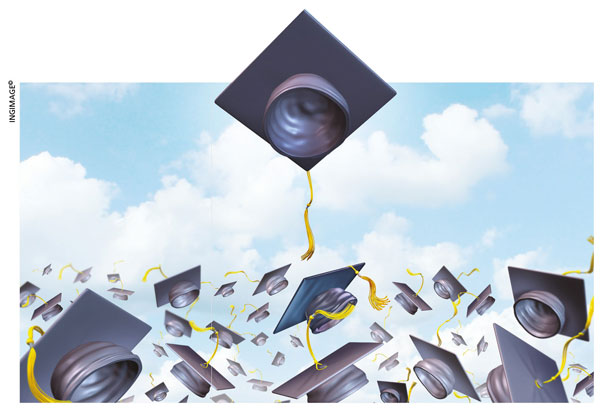EDUCATION SECTOR
HIGHER LEARNING QUANDARY
Janaka Perera wonders if there is light at the end of the tunnel for students
Observing the situation in Sri Lanka’s state run universities, one wonders if the entire higher education system has gone haywire. For nearly two decades, we have been watching university students repeatedly demonstrating, agitating over some issue or the other, and being baton charged, teargassed or subjected to police water cannons with virtually nothing achieved in the end.
During the protest demanding the closure of private medical college South Asian Institute of Technology and Medicine (SAITM), government medical students not only lost a whole year of their academic careers but also effectively shut down the next batches who were eagerly waiting to enter the medical faculty.
Not all the students participating in these demonstrations do so willingly. They’re coerced under threat of being subjected to harassment by the more politicised students’ unions. Their union leaders focus more on dubious political objectives rather than studies and passing exams in a certain time frame.
The perennial shortcomings of state universities – mainly due to a lack of funds – have become a godsend for political agitators. It is also a fertile ground for student thugs engaging in brutal ragging. This scourge has plagued our campuses for decades but no university administration has succeeded in eradicating the phenomenon so far.
Meanwhile, the State Minister for Higher Education and Cultural Affairs reportedly stated that nine students have died due to ragging over a period of 40 years. Four committed suicide as a result of trauma experienced during ragging and five percent of the victims were crippled while others suffer from mental illnesses.
While presenting evidence in 1975 before the V. W. Kularatne Commission to probe ragging, the late Dr. Buddhadasa Bodhinayake – Senior Medical Officer at Lady Ridgeway Hospital for Children and a counsellor at the National Youth Council – said that rag leaders should be psychoanalysed.
Last year, the faculties of at least five universities remained closed due to ragging as authorities struggled to bring these campuses under control. One serious incident led to the closure of the administrative offices and several faculties of the University of Ruhuna.
As in the case of government medical students, boycotting lectures will in no way reduce the cost of the education bill that taxpayers shoulder. Over 80 percent of the state’s revenue is earned from the poor and low income groups by way of indirect taxes.
Less than 30,000 of about 125,000 students who pass the GCE A-Level examination enter state universities. But does this mean that those who are left out are less qualified to pursue higher studies?
Today, they are left with three choices: gain admission to a foreign university, a local private university or an institute; or join a vocational training institute. But due to financial constraints, most seek employment that promises only low wages.
Contrary to misguided student organisations agitating against opening private universities, experiences in other countries suggest that state and private universities complement each other. These countries include neighbouring SAARC nations. Pakistan for example, had 74 approved private degree granting universities in 2015. All are supervised by that country’s Higher Education Commission (HEC).
Private universities offer current courses to aspiring students. They’re far ahead of state universities in terms of using modern technology in education. Their curricula are updated, and revised regularly and promptly while state run universities lag behind. Private universities provide students with skills that the job market requires.
The University Act of 1978 lacks a provision to establish local or international private universities. Therefore, a separate higher education act for national and international universities, and branch campuses as in Malaysia and Bangladesh, may be placed before parliament.
Senior Professor of the Department of Political Science at the University of Peradeniya Professor Gamini Samaranayake stressed this during a speech delivered at the Eastern University Sri Lanka (EUSL) convocation in 2013.
He saw the need for state universities to be responsive to changes taking place in the global and regional spheres. It is necessary for the government to permit recognised foreign universities to have branches in Sri Lanka and set up a special council to regulate them to ensure quality.
Generally, private universities are committed to quality education despite having business interests. They employ scholarly tutors with good qualifications by offering better terms, which exceed industry standards. Their own standards are used to sharpen students’ skills. Private universities give students the option of studying subjects of their choice without fear of being dragged into politicised protests.
Therefore, it is vital to establish a fair and reasonable system for university admissions.






At the end of the day, we can only come up with agreements and not just a conclusion. The education system cannot be a black and white scenario, nor can it be a grey area. Not being able to pass A-Levels to be qualified for university education does not indicate that it is the end of life. Those may be the people who land more successful careers than a typical university graduate.
The era that we live in is full of manipulation as well as opportunities. So watch out for the pitfalls and look forward to seize the good chances that come your way. The greatest of all is your mind power. Live with an independent mind and there will be less narrow mindedness, less misconception, and students will be able to glow as they turn out to be the pulse of the country in time to come. A better outlook to see the light at the end of the tunnel is to turn all your threats to opportunities.
This article addressed the deterioration in the quality of government universities while addressing the need for private universities. While it can be agreed on the former, the latter brings many concerns to be conferred. Many private universities and affiliations have not been able to tick off the ‘value for money’ concept than the adhering of standards. Students comment that the pricing of the degrees offered by these universities have compelled them to spend more time in Sri Lanka before they are transferred to a foreign university for the remainder of the degree, thereby wasting money and time unnecessarily, delaying the completion of the degree.
The private universities get a better profit margin from such policies. They probably have their ways and are the regulators. On the other hand, majority of lecturers are from local universities and perhaps some of them may not deliver the expected standard. The facilities, such as a fully-fledged libraries, need heavy investments and cannot just be limited to the profit motive. Some CEO’s or faculty heads of these so-called famous private universities, in spite of their PhDs, are not competent enough to be academic administrators of quality.
To be honest, can private universities fulfil the gap of the local university education system? The concern in this context is not to stop the private university education system but to regulate them continuously to keep up with standards of the qualifications and skills in demand.
Private schools are only interested in making money.
“Observing the situation in Sri Lanka’s state-run universities, one wonders if the entire higher education system has gone haywire.” Sorry, but I don’t think this applies to the entire gamut of higher education universities. I kindly request the author to pay a visit to the nearest university – University of Moratuwa. You will realise how hard the undergraduates work for innovation, and they do an absolute great job. No protests, just brilliance.
It takes two hands to clap. In progress, disagreement or even in an issue, viewpoints from both ends need to be addressed – impartially and intelligently. In this vicious cycle of higher education, there are many dependents and influencers rather than stakeholders as it should be.
Initially, the university education system in Sri Lanka took off on a grand scale and in the appropriate manner, and the graduates produced were recognized both locally and globally. Then, the politicians exploited the education system using it as bait, causing the distinction between the haves and have nots. The language fluency also paved way for a rift. As such, the higher education systems became vulnerable and a ground sensitive to social and economic imbalances.
Then came the free education system. The common man was under the impression that if one’s children got access to this free education, the world could be conquered, which was not the case as it cannot be generalised! Youth unrest then began when the degree was not marketable. There are certain students and lecturers who are perpetrators, and some political intervening hands with their own selfish agenda, who are given priority at the end of the day over the primary objective of education. Some of them just got away with a paper qualification and some were taught out of the book. Sadly, it was the enrichment of the brain, skills and mind which could not be transformed merely by attending a university or pursuing higher education elsewhere.
Now as you are aware, values and actions need to be nurtured from a young age at home, school and continuing on to higher education, the workplace and further into the governance/ political sphere. If these knots can be untied, we can see the light at the end of the tunnel.